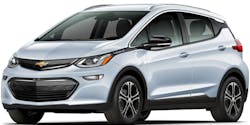General Motors—which sold 10 million cars and tricks last year—has announced that it is working toward a zero-emissions future starting with two new, fully electric models next year, and adding at least 18 more by 2023. The new models will be a mix of battery electric cars and fuel cell-powered vehicles.
GM thus follows Aston Martin, Daimler Benz, Jaguar Land Rover, Volkswagen, and Volvo among automakers that have announced similar moves. Volkswagen Group, which last year was the world’s top automaker, has said it will offer 80 new electric vehicles by 2025, and will electrify its entire lineup by 2030. Last month Daimler AG, the parent company of Mercedes-Benz, said it plans to offer electrified versions of all of its cars by 2022. Volvo has specifically committed to launching five fully electric cars between 2019 and 2021, along with 48 gas and diesel plug-in hybrid and mild hybrid models.
Among governments, China (the world’s largest car market), France, Great Britain, India, the Netherlands, and Norway have all said they plan to ban the sale of gas and diesel cars between 2030 and 2040.
With regard to China, GM had previously announced plans to launch 10 electric or hybrid electric cars in the country by 2020. The company already sells several electric cars, including the plug-in hybrid Volt and all-electric Bolt. Mark Reuss, GM’s executive vice president of global product development, purchasing and supply chain, declared during the GM announcement that the company’s next generation of zero emission cars “will be profitable,” adding for emphasis: “end of story.”
GM plans to offer more than plug-in cars. According to the company, hitting its targets will require a two-pronged approach to electrification that includes both battery electric and hydrogen fuel cell vehicles.
GM has been developing fuel-cell technology in partnership with Honda for nearly four years. Last week at CEATEC in Tokyo, Honda showed off a 70 mega pascal (MPa) Smart Hydrogen Station (SHS) Concept that generates, stores, and dispenses high-pressure hydrogen for fuel cell vehicles.
The world’s first hydrogen station equipped with a high-differential-pressure electrolyzer to realize hydrogen generating pressure of 82MPa (the filling pressure is 70MPa), it features the Power Creator, Honda’s high-differential-pressure electrolyzer that eliminates a compressor and in this way achieves compact packaging. The Power Creator generates hydrogen by means of electrolysis of water using electricity from various energy sources, including renewable energy.
GM also unveiled its SURUS, or Silent Utility Rover Universal Superstructure, a fuel cell-powered, four-wheel steering concept vehicle on a heavy-duty truck frame that is driven by two electric motors. SURUS will offer highly mobile autonomous capability and agility in unpredictable terrain. Operating multiple vehicles in a leader-follower configuration could reduce manpower requirements for high-volume trucking applications. For future potential military uses, the system’s inherent low heat signature and quiet operation offer benefits in reduced detection and risk.
SURUS leverages GM’s newest Hydrotec fuel-cell system, autonomous capability, and truck chassis components to deliver zero-emission propulsion. Benefits include quiet and odor-free operation, off-road mobility, instantaneous high torque, and quick refueling times.


